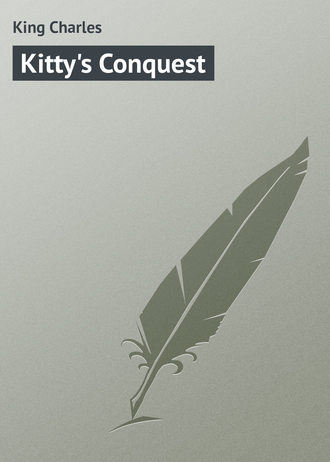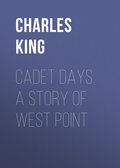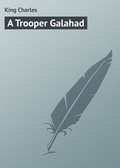
King Charles
Kitty's Conquest
The whistle for Sandbrook was just beginning as I rejoined Miss Kitty, and, after a vigorous life of at least two minutes, wound up in a dismal whine as we rolled in among the lights at the station. Yes, there they were, ready and waiting for us. The genial, gray-haired old judge and Miss Pauline herself, his only and devoted daughter, in whose arms Miss Kit was rapturously enfolded the instant she hopped from the platform. There, too, was old Jake Biggs, whom the conductor had mentioned as mademoiselle's escort in case no one else appeared, – Jake and his boon companion, his faithful old horse, "Bob," so named in honor of General Lee. Jake was an old colored servant of the Summers family, and had followed his "young massa," Harrod Summers, all through the war; had seen him rise from subaltern to colonel; had nursed him through wounds and illness; and at last when the war was over, and Harrod, who had gone forth with the enthusiasm and ardor of a boy, returned to his father's home, old Jake contentedly followed him, and settled down in one of the few log cabins that remained on the almost ruined estate of the Summers'. Jake was a "free nigger" now, but the world to him was wrapped up in old associations and "Mars' Harrod." No such soldier ever had lived as his "cunnel," no such statesman as the judge; no such belle as Missy Pauline. And Jake not only would not leave them, but in a vague and chivalric manner he stumbled about the premises, lording it over the young niggers and making mighty pretence at earning an independent livelihood for himself by "doin' chores" around the neighborhood, and in hauling loads from the depot to the different plantations within a few miles' radius of Sandbrook. He had managed to scrape up a dilapidated cart and harness somewhere or other, and poor old Bob furnished, greatly to his disgust, the draft and motive power. Having been a fine and spirited saddle-horse in his younger days, Bob had naturally rebelled at the idea of coming down to the level of the plantation mules, and had shown something of his former self in the vigorous and determined remonstrance which resulted on the occasion of Jake's first experiments with the harness; but beyond a temporary dislocation of buckles, straps, and dash-board, and a volley of African anathemas and "Whoa da's" from his master, poor old Bob's rebellion had accomplished nothing, and he had finally settled down into a resigned and dreamy existence, and went plodding about the vicinity with the asthmatic cart at his heels, a victim to the vicissitudes of war.
Jake was a pet of mine, and had amused me very much on the occasion of my first visit to the judge's, and that's why I tell so long a rigmarole about him. He stood there, a little aloof from the "quality folks," grinning and bowing, and making huge semicircular sweeps with his battered old hat, in his anxiety to do proper honor to the judge's guests.
I had a chance to receive my especial welcome while Miss Kit was being almost devoured by her relatives; and presently the baggage was all pitched off; the train moved on with a parting whoop; Mars appeared at the rear door and gave me a farewell wave of the hand; and then, leaving to Jake and Bob the responsible duty of transporting the young lady's trunks, we four – Miss Summers and Miss Kit, the judge and I – were duly ensconced in the comfortable old carriage, and went jolting off homeward.
Mr. Summers and I had much to talk about, and finding it impossible to get a word in edgewise with the two young ladies, who were fondling, fluttering, cooing, and chattering on the back seat in the most absorbed manner imaginable, we gradually drifted off into our law business and let them gossip away and exchange volleys of news and caresses.
The judge was deeply interested in my account of the adventure with the Ku-Klux, and much concerned about Amory's hurt.
I learned from him of the desperate and lawless character of the men who were generally believed to be the prominent members of the gang, and the perpetrators of the dastardly outrages that had been so recently inflicted both upon the negroes and the whites. The people were terrified beyond expression; several had been driven from the country; several had been shot down in cold blood. A defenceless girl who had been sent down from the North as teacher of the freedmen's school, had been dragged from her bed at midnight and brutally whipped by some cowardly ruffians. The sheriff, who had arrested one of the suspected parties, was threatened in an anonymous letter with death if he failed to release his prisoner within twenty-four hours. He called upon the citizens for assistance, but none was given, for the Union people were too few. A dozen men in mask surrounded his house the next night; his wife heard the strange noise, and went to the door; opened it, and was shot dead in her tracks. The jail was forced, the prisoner released and spirited off beyond the limits of the State.
All this was going on, when, to the great joy of peace-loving people, and undisguised anger of the unreconstructed, a troop of United States cavalry came suddenly to the scene. Several arrests of known murderers and marauders were made; and, until that very evening, nothing more had been heard of the dreaded Ku-Klux. Indeed, it was by some persons believed that their organization was broken up, and nothing but the positive testimony of one of their own neighbors, the man to whom Amory had turned over his prisoner, would induce the citizens generally to believe that Hank Smith himself was concerned in the attempted robbery of the express car. The cavalry had been there just about a month when this affair took place.
CHAPTER III
Miss Kitty's tongue had been far from idle all the time that the judge and I had been talking over these matters, but it was only just before we reached our destination that I heard her telling Miss Summers of the events of the evening. The moment she mentioned that our lieutenant was hurt, Miss Pauline started and exclaimed, —
"Oh, Kitty! You don't mean it! What will Major Vinton say?"
"Who is Major Vinton?" said Miss Kit.
"Major Vinton is the commanding officer of the cavalry, and Mr. Amory is one of his lieutenants. Father knows them both very well, and the major is with us almost every day," was the answer.
Miss Kit's eyes must have been as big as saucers when she heard that. I couldn't see, but knew it when she exclaimed, in tones almost horror-stricken, —
"Oh, Pauline! Do you mean to tell me that uncle and you receive Yankee officers! I wouldn't have believed it!"
"You don't know him, Kitty," was Miss Summers's quiet answer. "I believe that we owe father's life to him, and I know that, but for him, none of us could have remained here. He is a thorough gentleman, and you'd like him if you only knew him as we do. As for Mr. Amory, he is only a boy, to be sure; but the major says he is a fine officer, and I know that he is a real nice fellow."
Miss Kit relapsed into amazed silence; the judge added some few gentle words of reproof for her treatment of the youngster; and I was smiling to myself over the whole affair, when we drove up to the main entrance of their once beautiful home. A tall, soldierly-looking man opened the door, exchanged a word of greeting with Miss Summers as he assisted the ladies to alight, and then, as they scurried away up the stairs, I was introduced to Major Vinton.
Now, though we had never met before, the major's name was by no means unfamiliar. We were both New Yorkers; both had struggled through Columbia, and had many a wrestle with Anthon and Drisler; both had rushed to arms in heroic style and tramped off for Washington at the first call for troops. But I had speedily tramped back again; while he remained, chose the cavalry arm of the service, fought his way up to the command of his regiment; and when, in 1865, his services were no longer needed, sheathed his sabre; put aside his well-worn regimentals; tried hard to interest himself in some civil pursuit; took a brief tour abroad, returned just as the new organization of the regular army was being made, and meeting one night a joyous bevy of his old comrades, regular and volunteer, with whom he had fought over every field from Bull Run to Five Forks, the old fire was fanned into a blaze, and in one week he found himself a successful candidate for a captaincy of cavalry. The "major" came afterwards "by brevet," and Vinton had settled down into contentedly following the old life, though in a less exciting time and exalted capacity. He greeted me in a frank, warm-hearted way; and we were in the midst of a comparison of notes as to old college names, when the judge interrupted us with, —
"Vinton, Mr. Brandon brings important news, which I think you ought to know at once." So once again the story of our little adventure was told.
The major listened attentively and never interposed a word; but his brow darkened and his face set when I came to Amory's wound and Hank Smith's parting threat. The instant I finished he turned to a servant, saying, —
"Be good enough to tell my orderly to bring the horses round at once."
In vain the judge begged him to stay and have supper, or at least some little refreshment. The major said, very quietly, that he must be off to camp at once; asked me one or two more questions in a business-like way; and the moment the horses came, bade us good night, swung into saddle, and followed by his orderly, disappeared at a rapid trot. The judge and I stood listening on the portico until the hoof-beats died away, and then returned to the blaze of the great wood-fire in the sitting-room. The young ladies came fluttering down-stairs. Supper was announced. Miss Pauline looked inquiringly around as we walked into the next room, where a bounteous table was spread.
"Where is Major Vinton, father?"
"Gone back to camp, dear. He asked me to present his excuses to you, but he was obliged to leave as soon as he heard of this affair."
I fancied that a shade of disappointment settled on Miss Summers's face, but she merely answered, "Indeed, I'm very sorry," and busied herself with the tea and coffee.
Miss Kit looked immensely relieved, and immediately became radiant; – chattered like a little magpie, – in fact, was as charming and bewitching as possible; but it was already late; good-nights were soon exchanged; and, tired out, the household went to sleep.
Next morning when we assembled in the breakfast-room, our little heroine looked fresher, prettier, and tinier than the day before. This time her hair was "fixed," and that was the only point that in my eyes was no improvement. All day long the judge and I roamed about the premises or pored over the cases he had on hand. All day long the young ladies laughed, chatted, flitted about from one room to another, played and sang. No news came from the camp. Late in the afternoon, when we were all standing on the portico, a solitary trooper came cantering up the road along which the major had disappeared the night before. Without knowing why, I found my eyes turning upon Miss Summers. She was listening abstractedly to Miss Kit's account of a visit to the Mammoth Cave, but her eyes were fixed upon the horseman as he rapidly neared the gate, – neared it, and, never drawing rein or checking speed, rode stolidly past on the road to Sandbrook depot. The wistful, almost eager light faded from her soft brown eyes; the full lip quivered one little bit; but quickly rallying, she plunged into a blithe wordy skirmish with her cousin about some alleged flirtation of the summer previous.
Evening came, and with it Harrod Summers and Mr. Peyton; both making much over Miss Kit; both bemoaning the accident which had prevented their meeting; and both apparently pleased to know that "Mr. Brandon was so kind and attentive." I had known Harrod slightly before, as he was away much of the time of my previous visit; but I knew him to be his father's son, a man to be honored and respected. Of Peyton, the less said the better. He was a rash, foolhardy, and, I feared, criminally reckless boy, a violent "reb" and unsparing hater of every Yankee. I had heard grave stories concerning his connection with some of the acts of violence committed upon the Union-loving people in the vicinity, and had noticed the troubled look on the judge's face every time his name was mentioned. I knew that he had been arrested, and that there was strong presumptive evidence as to his guilt; but he had been immediately bailed out and released. After this occurrence, the judge had managed to persuade him to take a trip to Havana and New Orleans; but the moment he heard of Miss Kitty's projected visit he came hurrying back. They were second cousins, and had met abroad. Rumor had it that Peyton had offered himself; that Miss Kit had a girlish fancy for him; that his suit promised favorably until Aunt Mary became suddenly aware of this nice little family arrangement, and, being a woman of the world, and possessed of a keen sense of what constituted the eligible and ineligible in a young man, swooped remorselessly down upon the blissful pair; hustled Master Ned into immediate exile; and, gathering her one chicken under the shadow of her protecting wing, bore her in triumph away to a realm uninfested with dangerous young men. Miss Kit is said to have shed bitter tears one week; sulked the next; pouted another; to have made a vigorous and romantic attempt at pining in all three; but the effort was too much for her; and, being wisely left to herself, it was not long before Peyton and his escapades were to her matters of serene indifference.
Not so with him, however. To do him justice, Peyton was probably very much in love; and at all events had a very correct idea of the unlimited benefits to be obtained through the medium of Miss Kit's solid bank account. He was no fool, if he was a reprobate; and was as handsome and naughty a wolf as could be found infesting Southern sheepfolds; and here he was, primed and ready to renew the attack. The judge didn't like it; Miss Summers didn't; nor Harrod; nor I; but it only took a few hours to convince us all that our beauty had just enough feminine mischief in her to enjoy the prospect of another flirtation with her old flame; and so to all but Peyton and to her, the evening passed gloomily enough. The judge retired to his library; Miss Summers played soft, sad music at the piano; and Harrod and I smoked cigar after cigar upon the porch.
Ten o'clock came and still the pair were cooing away in the corner; Kitty's low, sweet, bubbling laugh floating out through the open casement to where we sat. Miss Summers closed her piano abruptly; came out to our nook on the portico; and, declining the offer of a chair, stood leaning her hand upon her brother's shoulder.
Harrod looked fondly up at her for a moment or two as she gazed out towards the gate; then a teasing smile played about his mouth as he asked, —
"Anybody been here to-day, Paulie?"
"No-o-o-o! That is, nobody to speak of."
"No major, then?"
Pauline looks squarely down into her brother's eyes as she answers, "No major, if you refer to Major Vinton." A little heightened color, perhaps, but that's all. She is as brave as Harrod and not easy to tease.
Harrod turns to me: "Do you think he has gone after those men with his troop, Mr. Brandon?"
"I don't know, colonel; he said nothing about it, but rode off immediately. I shouldn't wonder, though; for the judge tells me he is over here almost every day."
"Ye-e-es?" (inquiringly.) "How is that, Paulie?"
Paulie has no reasons to allege; probably he wouldn't come if he didn't want to.
"True enough," Harrod suggests; "and still less unless he knew he was welcome. He is awfully proud, isn't he, Paulie?"
"Indeed, Harrod, I don't know; but he is welcome, and any man who has rendered us the service he has in protecting our father against the fury of that mob on court-day, ought to be welcome among us!" – Color rising and a perceptible tremor of the hand on Harrod's shoulder. He takes it gently and leans his cheek lovingly upon it as he looks up at the flushing face, whose dark eyes still gaze unflinchingly into his own.
"You are right enough, dear, and you know I agree with you. He is a noble fellow, Brandon, and I hope you'll meet and know him better. Father's decision against two or three Ku-Klux raised a terrible row here; and as he attempted to leave the court-house with one or two friends the mob hooted him; and even his long residence among these people would not have saved him. They call him traitor and Yankee now. Well, father tried to speak to them, but they wouldn't listen. A few more friends gathered round him; a blow was struck; and then the mob charged. Shooting ensued, of course, and two of their own men were badly wounded, while father and his party of six barred themselves in the court-house. Old Jake Biggs dashed out to camp, luckily meeting Major Vinton on the way, and in five minutes from the time the first shot was fired, and before those howling devils could break down the door, Vinton darted at a gallop into their midst, – not a soul with him but his orderly, – rode up to the door as though he were built of cast iron, and then turned squarely and confronted the whole mob. There's only one thing on earth these people are afraid of, Brandon: they don't care a fig for law, sheriffs, or marshals, but they would rather see the devil than the Federal uniform. And for ten minutes Vinton and his one man kept that mob at bay; and then young Amory with half the troop came tearing into town, and if the major hadn't checked them, would have gone through that crowd in ten seconds.
"The mob skulked off; but they hate father and the cavalry most bitterly, and would wreak their vengeance if they dared. I was away in Mobile at the time, and knew nothing about the affair until next day, when my sister's telegram came; but the sheriff never tires of telling how the major rode into that crowd; and how mad Mr. Amory was because Vinton stopped his charge."
"No wonder you all think so much of him, colonel," I answered. "He comes of a noble old race, and whether as enemy or friend you cannot fail to respect him; and I'm glad to see a cordial feeling springing up between our sections in this way. I would to God it were more general!"
"Ah, Brandon, it is not the soldiers, not the men who did the fighting, who are bitter now. Our enemies in the North are the men who sat at home wondering why your Army of the Potomac didn't move. Your enemies are those who never felt the shock of Northern arms. We would have had peace long ago could the soldiers have been allowed to make the terms."
And so we sat and talked, until the clocks throughout the house were chiming eleven, and then Miss Summers declared we must retire. The corner flirtation was broken up; Peyton and Miss Kit exchanging a lingering and inaudible good-night at the stairs. Harrod and I closed and bolted doors and windows. Peyton stuck his hands in his pockets and walked nervously up and down the hall buried in thought until we had finished our work; and then, on receiving Colonel Summers' somewhat cold intimation that it was time to go to bed, wished us a sulky "pleasant dreams," took his candle and disappeared.
Harrod waited until he was out of hearing and then said to me, "They are all out of the way now, Brandon, and I want to see you one moment. It is a hard thing to say of one's own kinsman, but Peyton can't be trusted in this matter. Here is a letter that was left for father at the post-office in town, but I have opened and withheld it, knowing that it would only cause him unnecessary trouble. I'm worried about it, and had hoped that Vinton would have come over to-day; we're safe enough with him and his men."
Saying this he handed me the letter. I had seen them before; Ku-Klux anonymous rascalities, – a huge, coarse, brown envelope, directed in a sprawling hand to the "Honerable Judge Summers," and embellished in red ink with numerous death's-heads, K. K.'s, and in the upper left-hand corner a flaming scroll, on which appeared in bold relief the words "Blood! Death! Liberty!" The whole affair was ludicrous enough in appearance, and, throwing it to one side, I read the inclosure. It began with the usual "Death to Traitors," and wound up, after one or two incoherent "whereases" and "therefores," by informing the judge that if he remained in that vicinity twenty-four hours longer "all the damned Yankees this side of hell couldn't save him," and intimating that the lives of the Federal officers upon whom he relied "weren't worth their weight in mud."
Harrod and I sat for some time talking over this elegant document, and decided that nothing should be said until we could see Major Vinton on the following day. The camp was six miles away, and on the outskirts of the county-seat where the court-house row had taken place; and Sandbrook was nearly as far in the opposite direction. He anticipated no danger for that night; but such had been the reckless nature of the Klan, that we agreed it best to be on the safe side and to look well to our arms; then we parted, each to his own room.







